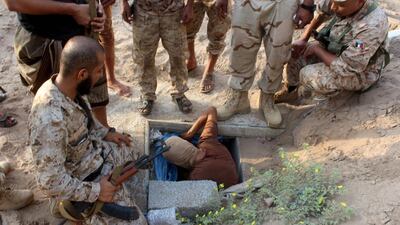Riyadh // The Saudi-led coalition in Yemen launched an investigation on Tuesday into an air raid which a doctors’ charity claimed had killed 11 people at a hospital it supports.
More than 19 people were also wounded in the strike that hit the hospital on Monday in Abs in the rebel-held northern province of Hajja, Medecins Sans Frontieres said.
The coalition is also investigating an air strike on Saturday which allegedly hit a school where 10 children were killed.
The coalition, which includes the UAE, began the bombing campaign in March last year in support of the internationally recognised government against Shiite Houthi rebels and their allies.
The Houthis took over the capital Sanaa in 2014, before seizing large parts of Yemen.
The coalition increased air strikes this month after UN-mediated peace talks between the rebels and Yemen’s government were suspended.
A Joint Incidents Assessment Team, composed of members of the coalition, said it “has urgently launched an independent investigation” into the hospital strike and promised to announce its findings publicly.
Earlier this month, the assessment team said it acknowledged “shortcomings” in two of eight cases it investigated of air strikes on civilian targets in Yemen.
In one case, the team held the coalition responsible for hitting an MSF-run hospital but accused the rebels of having used the facility as a hideout.
The team is also investigating Saturday’s strikes in the rebels’ northern stronghold of Saada, which MSF said hit a school but the coalition claimed targeted a rebel training camp with child soldiers.
The coalition’s spokesman on Tuesday accused the Houthis of using the three months of negotiations to rearm.
“They were deceiving people by this negotiation, to reorganise their force, resupplying their forces and getting back to fighting,” Brigadier General Ahmed Assiri said.
MSF said Monday’s attack was the fourth on one of its facilities in less than a year.
“Once again, a fully functional hospital full of patients and MSF national and international staff members, was bombed in a war that has shown no respect for medical facilities or patients,” said Teresa Sancristoval of MSF’s emergency unit in Yemen.
MSF said the hospital’s GPS co-ordinates “were repeatedly shared with all parties to the conflict, including the Saudi-led coalition, and its location was well-known”.
UN Secretary General Ban Ki-moon said he was “deeply disturbed” by the intensification of air raids in Yemen.
The rebels formed the so-called Supreme Political Council late last month, in a move that put an end to peace talks in Kuwait.
A UN envoy has described the ruling body as a violation of commitments to the peace process.
Fresh coalition strikes on Tuesday struck Abs, Saada and areas surrounding Sanaa, military sources and residents said.
Meanwhile, the Emirates Red Crescent launched the second aid convoy to Abyan province, to deliver aid to towns and villages.
The convoy included 1,500 food baskets and tents, UAE state news agency Wam reported.
foreign.desk@thenational.ae
*Agence France-Presse

